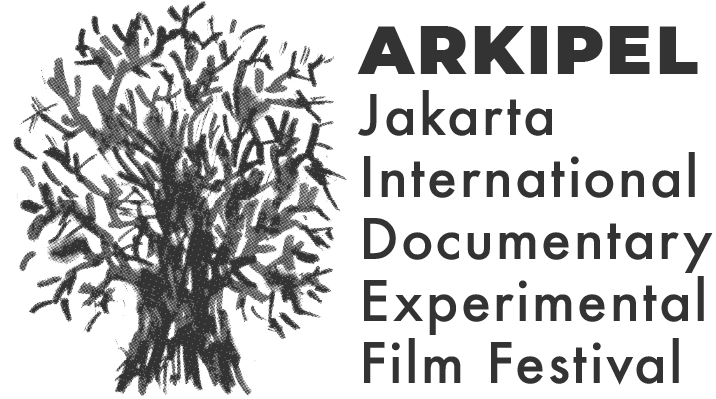Kamera sebagai Alat Merebut Kuasa
Ketika dunia terus mengancam dan teriakan suara teror mengisi kepala, apa yang pantas dilakukan seseorang? Menurut kuratorial ini, jawabannya adalah untuk mengeluarkan kamera dan merekam.
Ketika akses alat perekam menjadi lebih mudah, siapa pun dapat membuat video hanya dengan menekan satu tombol. Bagi massa, kebebasan untuk merekam dan membagikan informasi merupakan kekuatan sendiri, terutama ketika melapor kejadian ketidakadilan.
Ketika George Floyd ditahan oleh polisi, Darnella Frazier yang juga berkulit hitam dan berumur 17 tahun pada waktu kejadian hanya bisa merekam kejadian. Bagi Darnella, ia tidak punya kemampuan untuk melawan, tapi videonya mampu memicu protes skala internasional.
Bagi orang yang tidak punya kuasa, kamera adalah satu-satunya alat terkuat yang mereka punya.
Itulah ide besar Anggraeni Widhiasih dalam Kompetisi Internasional 5: Zona Penumbra. Selaku kurator, Anggraeni menghubungan komunikasi dan kuasa. Siapa pun yang menguasai jaringan komunikasi mempengaruhi jalur informasi. Tetapi, kini hampir semua orang mempunyai alat untuk berbicara dan mewakili diri sendiri, menawarkan pandangan yang belum tentu dibahas oleh media arus utama.
Kompetisi Internasional 5: Zona Penumbra tayang perdana secara luring dan daring pada Minggu (5/12). Karena situasi pandemi, penayangan luring hanya dilaksanakan di Bioskop Forum Lenteng. Ini merupakan pertama kali ARKIPEL Twilight Zone – 8th Jakarta International Documentary and Experimental Film Festival ditayangkan di bawah atap penyelenggara.
Mengejar penayangan bioskop Minggu kemarin merupakan kedua kali kakiku menginjak rumah baru Forum Lenteng. Menetap di Jl. H. Shibi—sebelumnya di Jl. H. Saidi—rasa canggung merasuki tubuh ketika sebuah gedung batu bata muncul dalam ranah penglihatan. Semua keraguan dan kecemasan hanyut ketika memasuki gerbang putih dan disambut dengan hangat.
Ruang pemutaran dibuka sekian menit lewat 13.00. Berbeda dengan Goethe-Institut atau Kineforum—veteran penonton ARKIPEL kenal erat kedua lokasi tersebut—Bioskop Forum Lenteng terasa seperti rumah, dan dihadiri oleh 15 orang, ada rasa kedekatan antara penonton. Disinari oleh cahaya layar, Anggra—panggilan akrab Anggraeni—berdiri di depan ruang, membaca catatannya dan memperkenalkan kuratorialnya serta filem-filem yang akan tayang.
Pertama ada Hut (2019) oleh So Ye-hen. Pekerja migran Indonesia di Taiwan menjadi fokus utama filem ini. Terbuat dari kayu dan kardus, seorang migran Indonesia membuat gubuk “ala-ala” sebagai tempat bagi para pekerja Indonesia lain untuk mencari suaka.
Awalnya ditinggali oleh dua orang, lama-kelamaan gubuk yang hanya muat satu kasur dan rak kecil, penuh oleh pekerja migran. Karena semua ingin berbicara, tidak ada yang bisa mengikuti pembicaraan.
Dalam Hut, ada yang menonjol: Bagaimana kamera ingin menangkap masalah, dan bagaimana orang-orang menjadi akrab dalam sekejap. Seolah ingin mengatakan bahwa semua masalah sama penting, kamera hendak menangkap semua curhatan para migran. Namun, ketika terlalu banyak masalah yang ingin disoroti, hasilnya tidak fokus dan menjadi suara bising. Di sisi lain, kebisingan tersebut menunjukkan bahwa ini bukan kasus langka. Terdampar di negara asing, ditindas oleh majikan atau bos, para migran Indonesia menemukan komunitas dan ketenangan antara sesama pekerja.
Filem kedua dalam program ini disutradari oleh Maibam Amarjeet Singh. Ia mengikuti sopir truk bernama Arunjit dalam perjalanannya meliputi jalur Guwahati-Imphal di Highways of Life (2019). Dengan kamera amatir, Amar menangkap konflik ekonomi dan politik yang terjadi diantara perbatasan India, Tiongkok Barat, dan Myanmar.
Yang membuat Highways of Life mengejutkan adalah bagaimana pembuat filem menangkap momen dan situasi. Selama perjalanan, kamera menjadi “pengganggu” yang mampu mengambil aksi untuk merekam situasi ketika bertemu konflik. Dari jembatan yang membutuhkan puluhan hari untuk diperbaiki, bertemu penjaga jembatan yang bersikeras, hingga merekam kekerasan seorang sopir di tangan tentara, atau mendekati pemrotes di perbatasan, kamera mendatangi sumber konflik.
Di sisi lain, ketika berhadapan dengan kekuatan aparat, para sopir tidak mempunyai kekuatan untuk melawan atau bertindak. Mereka hanya bisa berjarak, berkumpul, tetap waspada, dan berharap akan selamat bersama.
Kuratorial ini melihat kedua filem sebagai contoh peran kamera sebagai agen dalam merekam masalah minoritas yang sudah disisihkan. Ternyata, kedua filem ini juga menawarkan gagasan bahwa ada kenyamanan dalam kebersamaan.
Ketika konflik akan terus terjadi dan hari esok tidak pasti, cenderung kita mencari perlindungan dan kenyamanan dalam sesama manusia. Dalam kuratorial Anggra, kamera merupakan medium komunikasi untuk menyoroti topik-topik tersebut. Tetapi, ketika kamera tidak berjalan, kita beralih ke orang lain untuk mendengarkan cerita kita.
Program ini dapat diakses dari tanggal 5 Desember – 11 Desember di website Festival ARKIPEL.
Terjemahan Bahasa Inggris oleh Innas Tsuroiya
Camera as Means to Seize Power
When the world continues to menace and the scream of terror gets into the head, what must one do? According to this curatorial, the answer is to retrieve a camera, and to film.
When the access to a recording device becomes easier, anyone is able to record a video just by tapping a button. For the masses, the freedom to record and share information is a kind of power, especially when reporting an event of injustice.
When George Floyd got arrested, Darnella Frazier, a seventeen-year old black girl who was present at the location, could only record the incident. For Darnella, she didn’t have the capacity to resist, but her video sparked a protest on an international scale.
For the powerless, the camera might be the most powerful tool they have.
So there goes Anggraeni Widhiasih‘s grand idea of International Competition 5: Penumbral Zone. As a curator, Anggraeni connects the dots between communication and power. Whoever controls the communication network, controls the information route. However, as of late, almost everyone possesses the device to speak and advocate for themselves, offering a perspective that is often overlooked by mainstream media.
International Competition 5: Penumbral Zone debuted its screening offline and online on Sunday (12/5). Because of the pandemic, the offline screening was only held at Bioskop Forum Lenteng. This is the first time ARKIPEL Twilight Zone – 8th Jakarta International Documentary and Experimental Film Festival is screened at the headquarters.
Having caught the movie screening last Sunday was my second time visiting the new base of Forum Lenteng. Here on Jl. H. Shibu — previously on Jl. H. Saidi — a nervous feeling seeped into the body when I saw a building of bricks. But the doubt and anxiety dispersed once I entered the white gate and was welcomed with warmth.
The screening room opened a few minutes after 1 PM. Unlike Goethe-Institut or Kineforum—an ARKIPEL regular would know both locations by heart—Bioskop Forum Lenteng felt like home. Attended by 15 people, there was a kind of closeness between viewers. Illuminated by the projecting light, Anggra—Anggraeni’s nickname—stood in the front of the room, read her notes, and introduced her curatorial program and the films featured in it.
First film is Hut (2019) by So Ye-hen. Indonesian migrant workers in Taiwan are the primary focus of this film. From wood and cardboards, an Indonesian migrant worker built a makeshift hut for other Indonesian migrant workers for a site of refuge.
At first, there were only two people in the hut that could only contain a mattress and a small shelf. Gradually, the hut got cramped by migrant workers. Because everyone wants to speak, nobody can follow the conversation.
In Hut, something stands out: how the camera wants to capture the problems, and how people grow close in a short span of time. As if saying that all problems are equal, the camera wants to record all the chatter of all migrant workers. However, since too many problems are put into the spotlight, the result is unfocused, a mere noise. On the other hand, the noise reveals that this problem is nothing rare. Being neglected in a foreign country, exploited by employers or bosses, these Indonesian migrant workers find community and peace among fellow migrant workers.
The second film in the program is directed by Maibam Amarjeet Singh. He follows a truck driver named Arunjit in his journey across the Guwahati-Imphal high road in Highways of Life (2019). Using an amateur camera, Amar captures the political-economic conflict across the border of India, West China, and Myanmar.
What surprises me about Highways of Life is how the director catches every moment and situation. During the long drive, the camera acts like a “disturbance” that can record a situation of conflict. From a bridge that requires days to weeks to fix, to meeting a stubborn bridge guard; from recording the violence of army personnel against a truck driver, to approaching a protestor on the border, the camera actively seeks the source of conflict.
On the other hand, faced with the power of cops, the drivers have no capacity to resist nor act. They can only secure a distance, gather, stay alert, and wish for the safety of all.
This curatorial program believes that both films give the example of the camera as the recording agent of the problems of marginalized minorities. As it turns out, both films offer the notion that there’s comfort in togetherness.
When conflict keeps happening and tomorrow is not guaranteed, we tend to seek refuge and comfort from fellow humans. In Anggra’s curatorial program, the camera becomes a medium of communication to shine a light on those topics. But when the camera is not working, we turn to other people to listen to our story.
This program can be accessed from 5 December – 11 December through the Festival ARKIPEL website.
English translation by Innas Tsuroiya



